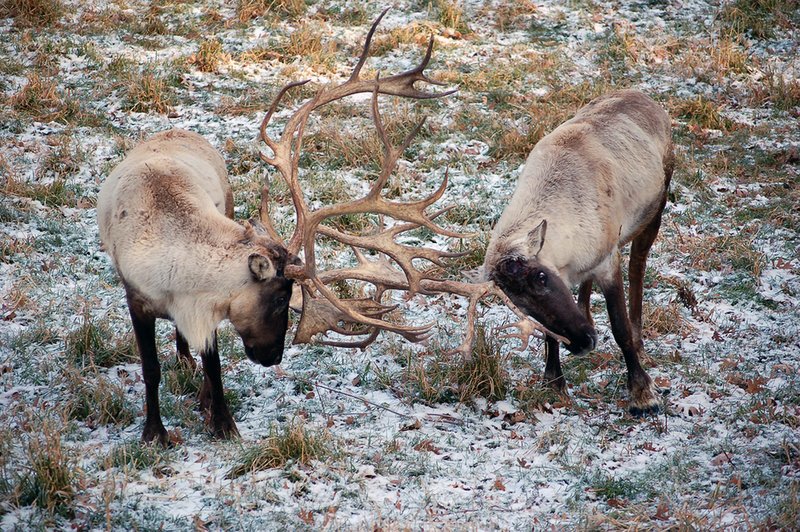
Federal Wildlife Agency Announces Protections For Caribou Habitat In Washington And Idaho
BY KEITH RIDLER / AP
U.S. officials on Wednesday announced protections for woodland caribou and their habitat in parts of Idaho and Washington.
The U.S. Fish and Wildlife Service designated the southern mountain population of woodland caribou as endangered and confirmed 47 square miles in Idaho and Washington as critical habitat requiring special protection.
The agency’s decision came after environmentalist groups sued to seek the critical habitat designation that requires federal agencies to consult with Fish and Wildlife before approving activities like logging or road building.

Two caribou in northwest Montana knock their antlers together. On Wednesday, Oct. 2, 2019, U.S. federal officials finalized protections for caribou habitat in the lower 48 states. CREDIT: Montana Fish Wildlife and Park via AP
The designation after the last caribou from the dwindling herd using that habitat were captured last November and January and relocated farther north in Canada for a potential breeding program.
The environmentalists hope caribou will return to Idaho and Washington amid efforts by U.S. and Canadian officials aimed at helping caribou herds grow.
Nearly all the imperiled 1,200 caribou in 15 herds of that population roam in the Canadian province of British Columbia, with one of those herds crossing back and forth into Idaho and Washington. The population in Canada is listed as threatened under that government’s Species at Risk Act, which is Canada’s version of the United States’ Endangered Species Act.
“The idea is that the U.S. and Canada will now participate across the international border to conserve and recover the subpopulation of woodland caribou,” said Fish and Wildlife spokeswoman Miel Corbett.
Native American tribes in the U.S. and Canada, where they are called First Nations, are also working to help caribou rebound.
The caribou population listed Wednesday is considered distinct from other caribou for several reasons. They have hooves the size of dinner plates that act like snowshoes and can travel where predators can’t follow. They survive all winter eating lichens found on the branches of old-growth trees, unlike other caribou that migrate to new areas.
Caribou once roamed the northern Rockies in Washington, Idaho and Montana, the upper Midwest and the northeast.
But experts have said development in Idaho and Washington adversely affected the last caribou population in the lower 48, with logging removing old-growth forests, roads fragmenting the area and predators using roads to reach caribou in their mountain sanctuaries.
The Center for Biological Diversity is one of the groups involved in the lawsuit filed in July seeking protections for the caribou, also known as reindeer, leading up to Wednesday’s action.
“It’s exciting news that these unique reindeer finally have the endangered species protections they need to avoid extinction,” said Andrea Santarsiere, a senior attorney at the center.
The herd that roamed in Idaho and Washington, called the southern Selkirk Mountains herd, was previously viewed by Fish and Wildlife as a distinct population and was protected as endangered in 1983. Fish and Wildlife’s action Wednesday, based on genetics, lumps that herd in with the southern mountain population of woodland caribou and recognizes the entire population as needing protection.
A 2011 proposal to designate some 470 square miles for caribou on the U.S. side of the border was pared back to the current size the next year following complaints by snowmobile groups and others. Environmental groups contend the current size isn’t large enough to support caribou in the U.S.
Meanwhile, the herd continued declining with the last handful of survivors captured late last year and early this year in Canada to be held in captivity north of Revelstoke, British Columbia. A breeding program there could eventually help return caribou to the lower 48.
Copyright 2019 Associated Press















